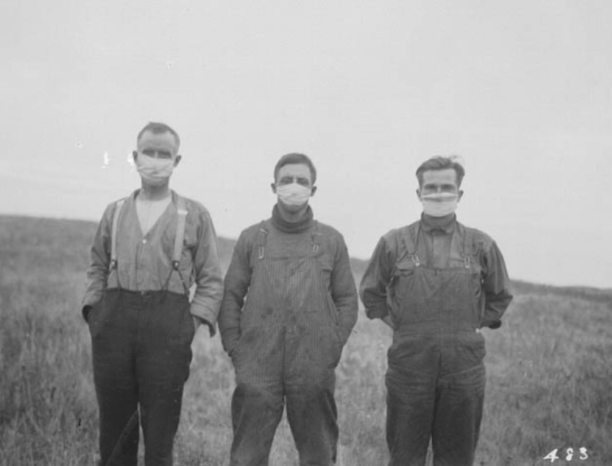Post-Pandemic Intimacy: What Can We Look Forward To?
Resisting socializing is easy for some—that might be a problem
BY: VAISHNAVY PUVIPALAN
Men wearing masks during the 1918 Spanish flu pandemic / Photo via Library and Archives Canada
Happy COVID-versary! It has been about a year since the Ontario government implemented lockdown measures, making this an opportune moment for reflection. “What have we gleaned from all this? Where will we go from here?” etc. I find myself wondering.
I once believed that the consequence of all this, once we return to “normal,” would be a sexual renaissance. With all that pent-up energy, we would have no choice but to start greeting each other with French kisses. And experts agree, sort of. Yale Social Epidemiologist Dr. Nicholas Christakis is optimistic; he anticipates an era of hedonism post-pandemic, a renewed zest for life, and that we will “relentlessly seek out social interactions.”
And he can say that with confidence because there is precedent for it. We need only to turn back the clock a hundred years to know that.
A novel solution for hookups during the 1918 Spanish Flu / Photo by Popular Science Monthly via My Heritage
If the Spanish flu ushered in the Roaring 20s, then the natural conclusion of the coronavirus is also the Roaring 20s. There is a parallel for the “kissing rackets” of a century ago in Canada’s beleaguered Chief Medical Officer Dr. Theresa Tam. Although she is very competent and indispensable in our battle against COVID and all that, I am certain we will mostly remember her for this:
What is a mask but a condom of the face? / Photo via YouTube
Her advice was met with ridicule all over the internet of course. Wearing a mask, the symbol of isolation during the most intimate act is absurd. Messaging like this from medical experts, government officials, and the like suggest that there is a libidinal bubble waiting to burst, that we are all suffering greatly from touch-starvation, and that we cannot help but seek out risky sex even if it could hurt us.
But I think this message was perceived as ridiculous online in part also because it is also anachronistic. It is funny that Generation Z and Millenials, the so-called “hookup generations” are the ones experiencing record-breaking levels of sexlessness and yet we are the main subject of the impositions to stop partying so hard.
How are we holding up, guys? / Graph via The Washington Post
Yes, I’m aware that there exist two very different classes of young people in this pandemic. There are those who resist (or wish to resist) stay-at-home orders, throwing nightly beach gatherings and such, they are the ones most targeted by these new measures.
Some things never change: Burlington Beach c. 1918 and Huntington Beach c. 2020 / Photos via Library and Archives Canada and Reuters
But I am more interested in the other class, those who dare not admit it but are thriving while social distancing. Mind you, I do not mean in a healthy way, baking bread, tie-dying, working out, and so on. I mean the Extremely Online whose antisocial tendencies are enabled by this predicament.
The internet as a community is in the habit of upholding the reclusive neurotics of the world (like myself) and fetishizing introversion. For them, there will be no Roaring 20s v.2.0 but a perverse nostalgia for a time when limited social interaction was encouraged for a time when they could smugly impose their isolated lifestyle, punctuating their social media activity with the refrains “WASH YOUR HANDS,” “MASKS SAVE LIVES,” “SOCIAL DISTANCE,” “#COVIDIOT” out of glee disguised as social consciousness. You have to wonder, when you see the Tweet confessional, “tbh, my life hasn’t changed that much after the covid,” is that shame or pride? Inevitably the internet draws the most atomised of the audience out from the woodwork to empathize.
I see article after article designed to assuage, “It’s okay to enjoy this pandemic,” despite the horrors of this chapter of reality. I do not disagree to be sure. If you happen to function better while working over Zoom, enjoy marathon-binging Tiger King, hate making small talk with cashiers, love wearing a mask, now is your time, enjoy it! But I am critical of any attempt to normalize the quarantine lifestyle and any attempt to pathologize the way we were.
For the record, a study has shown that blowing on a cake can increase its surface bacterial content by 1400% / Photo via Twitter
I should hope that this reflects only a fringe belief of the Extremely Online but the replies leave me unsure. No doubt this paranoia-fueled over-intellectualizing of basic social interaction is a sign of the times. “Gee, when you think about it, shaking hands is really gross.”
While it is fun to speculate and catastrophize, for all this theorizing I think it is far more likely that, as French Writer Michel Houellebecq put it, “We will not wake up after the lockdown in a new world. It will be the same, just a bit worse.”
I urge you not to intellectualize this most basic need and when all this is over, hug someone as soon as we can.





